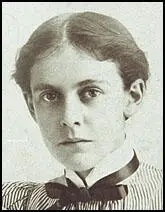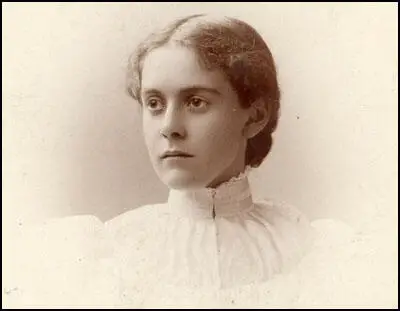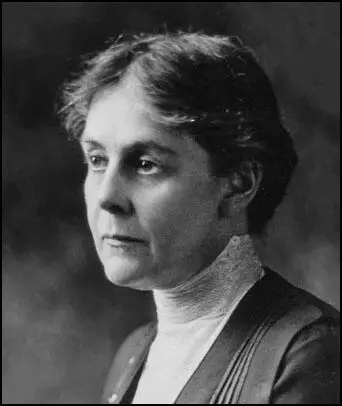Alice Hamilton

Alice Hamilton, the sister of Edith Hamilton, was born in New York on 27th February, 1869. According to Harriet Hyman Alonso: "Alice Hamilton, daughter of a wealthy entrepreneurial businessman in Fort Wayne, Indiana, and reared in a traditional Presbyterian family that valued philanthropy and education. Both her parents (particularly her mother) contributed great sums of money to community organizations, especially those addressing charity and the elimination of poverty. In addition, her mother was an early advocate of both temperance and woman suffrage, which introduced Hamilton to issues of concern to women."
Hamilton graduated from the University of Michigan Medical School in 1893. She served internships at hospitals in Minneapolis and Boston before studying bacteriology at the University of Leipzig and at the Johns Hopkins Medical School. In 1897, after graduate work in bacteriology and pathology, she accepted a position as professor of pathology and director of the histological and pathological laboratories at the Woman's Medical School at Northwestern University in Chicago.
After hearing a speech by Jane Addams she decided to join the Hull House settlement in the city. Other social reformers living at the settlement included Ellen Gates Starr, Alzina Stevens, Edith Abbott, Grace Abbott, Florence Kelley, Julia Lathrop, and Sophonisba Breckinridge. Hamilton increasing became interested in social issues. In 1910 Charles S. Deneen, the governor of Illinois, appointed her to a commission to investigate occupational diseases. She studied industrial poisoning in the lead, rubber and munitions industries and was able to prove that lead, nitrous fumes and viscose rayon were causing serious side effects including mental illness, loss of vision, paralysis and in some cases, death. Hamilton used this evidence to pressurize politicians to pass workmen's compensation laws and factory owners to provide safer working conditions. Hamilton's research into the dangers of industrial pollution was also used in the campaign against child labour.

On the outbreak of the First World War, Hamilton and a group of women pacifists in the United States, began talking about the need to form an organization to help bring it to an end. On the 10th January, 1915, over 3,000 women attended a meeting in the ballroom of the New Willard Hotel in Washington and formed the Woman's Peace Party. Other women involved in the organization included Jane Addams, Mary McDowell, Florence Kelley, Anna Howard Shaw, Belle La Follette, Fanny Garrison Villard, Emily Balch, Jeanette Rankin, Lillian Wald, Edith Abbott, Grace Abbott, Crystal Eastman, Carrie Chapman Catt and Sophonisba Breckinridge.
In April 1915, Arletta Jacobs, a suffragist in Holland, invited members of the Woman's Peace Party to an International Congress of Women in the Hague. Hamilton, Jane Addams, Grace Abbott and Emily Bachwere chosen to represent the United States. Others who went to the Hague included Lida Gustava Heymann (Germany); Emmeline Pethick-Lawrence, Emily Hobhouse, (England); Chrystal Macmillan (Scotland) and Rosika Schwimmer (Hungary).
Hamilton visited Germany in 1915. She later recalled: "One must always remember that most Germans read nothing and hear nothing from the outside. I talked with an old friend, the wife of a professor under whom I worked years ago when I was studying bacteriology in Germany. She and her husband are people with cosmopolitan connections, they read three languages beside their own, and have always been as far removed as possible from narrow provincialism, but since last July they have known nothing except what their Government has decided that they shall know. I did not argue with my friend, but, of course, we talked much together and after she had been with us for three days she told me that she had never known before that there were people in England who did not wish to crush Germany, who wished for a just settlement, and even some who were opposed to the war."
The women were attacked in the press by Theodore Roosevelt who described them as "hysterical pacifists" and called their proposals "both silly and base". Hamilton, along with Jane Addams, Florence Kelley, Alice Hamilton, Emily Balch, Mary Church Terrell, Jeanette Rankin and Lillian Wald attended the Women's International League for Peace and Freedom conference in Zurich in April, 1919. After the conference Hamilton and Addams made a tour of the Western Front.

Hamilton lived in Hull House for twenty-two years and thereafter returned for several months every year while Jane Addams was alive. In 1919 Hamilton became the first woman to be appointed to the staff at the Harvard Medical School. She also did studies on industrial pollution for the federal government and the United Nations. She also wrote several books including Industrial Poisons in the United States (1925), Industrial Toxicology (1934) and Exploring the Dangerous Trades (1943).
Hamilton was a member of the League of Women Voters, the Women's Trade Union League, the National Consumer's League, the American Civil Liberties Union, the Fellowship of Reconciliation and the Women's International League for Peace and Freedom. In 1927 Hamilton joined with John Dos Passos, Paul Kellogg, Jane Addams, Upton Sinclair, Dorothy Parker, Ben Shahn, Edna St. Vincent Millay, Floyd Dell, George Bernard Shaw and H. G. Wells in an effort to prevent the execution of Nicola Sacco and Bertolomeo Vanzetti.
Even after Hamilton retired she continued to be active in politics and was a supporter of Franklin D. Roosevelt. She also campaigned against McCarthyism, the execution of Julius Rosenberg and Ethel Rosenberg, and the Vietnam War. At the age of eighty-eight Hamilton remarked that: "For me the satisfaction is that things are better now, and I had some part in it."
Alice Hamilton died on 22nd September, 1970, aged 101.
Primary Sources
(1) Harriet Hyman Alonso, Women at the Hague (2003)
Alice Hamilton, daughter of a wealthy entrepreneurial businessman in Fort Wayne, Indiana, and reared in a traditional Presbyterian family that valued philanthropy and education. Both her parents (particularly her mother) contributed great sums of money to community organizations, especially those addressing charity and the elimination of poverty. In addition, her mother was an early advocate of both temperance and woman suffrage, which introduced Hamilton to issues of concern to women. Her educational journey led her to an M.D. degree from the University Of Michigan in 1893 and then to internships in women's and children's hospitals in Minneapolis and Boston. In 1897, after graduate work in bacteriology and pathology, she accepted a position as professor of pathology and director of the histological and pathological laboratories at the Woman's Medical School at Northwestern University. Hamilton found her life at Northwestern less than engaging. The Woman's Medical School was in decline, and she apparently had no colleagues whom she considered friends. Because she had been reared to value humitarian efforts, Hamilton sought out Hull-House, where she became a resident and close friend of Addams. She lived there for many years and even after moving on returned often and for lengths of time until Addams's death.
(2) Alice Hamilton joined Hull House in 1898 and stayed for twenty-two years. Hamilton wrote about her experiences in her autobiography, Exploring the Dangerous Trades (1943)
Life at Hull House was very simple so far as luxuries went, but it was full of beauty. Miss Addams and Miss Starr brought with them many charming furnishings, and whatever they bought had the two qualities of durability and beauty. Our food was inexpensive, but dinner was served to us in a long, paneled dinning room, lighted with chandeliers of Spanish wrought iron; breakfast in a charming little coffee-house built in imitation of an English inn. To me, the life there satisfied every longing, for companionship, for the excitement of new experiences, for constant intellectual stimulation, and for the sense of being caught up in a big movement which enlisted my enthusiastic loyalty.
My part in it was humble enough. At that time there were few of the social services which now we take as a matter of course. Hull House had to have its own day nursery, kindergarten, public baths, playground, as well as all the other activities which settlements still carry on. There were no baby clinics, and, though I did not feel at all competent to treat sick babies, I did venture to open a well-baby clinic which very soon was taking in all the older brothers and sisters, up to eight years of age.
Life in a settlement does several things to you. Among others, it teaches you that education and culture have little to do with real wisdom, the wisdom that comes from life experiences. If one's contact with the poor is only through their organizations, their clubs and trade unions, one gets a very one-sided, distorted impression of the working-class, which contains not only rebel youth but conservative middle age, not only the radical leader but his wife, who cares more for a nice flat and an electric refrigerator than for the emancipation of the workers.
(3) Alice Hamilton, At the War Capitals (1915)
One must always remember that most Germans read nothing and hear nothing from the outside. I talked with an old friend, the wife of a professor under whom I worked years ago when I was studying bacteriology in Germany. She and her husband are people with cosmopolitan connections, they read three languages beside their own, and have always been as far removed as possible from narrow provincialism, but since last July they have known nothing except what their Government has decided that they shall know. I did not argue with my friend, but, of course, we talked much together and after she had been with us for three days she told me that she had never known before that there were people in England who did not wish to crush Germany, who wished for a just settlement, and even some who were opposed to the war.
(4) Alice Hamilton, Exploring the Dangerous Trades (1943)
Another happening which is stamped on my memory concerns a young Irish girl of sixteen, gentle and shy, with the natural good breeding which one finds often among the poorest Irish and which makes one believe that they are right in saying that theirs was an old civilization when we Anglo-Saxons were still savages. Celia was a waitress in an all-night restaurant, for at that time a girl might work twelve hours a night seven nights a week in Illinois. for her protection I had her join the waitresses' union, and when her place went on strike she took her turn picketing. Chicago police have never felt it part of their duty to observe the law toward strikers; violence, often needless and unprovoked, had been the rule. I felt personally responsible for Celia and made my way through the crowd outside the restaurant just in time to see her dragged along, unresisting, by a huge policeman and hustled with abusive words into a police van.
(5) Alice Hamilton, Exploring the Dangerous Trades (1943)
Another happening which is stamped on my memory concerns a young Irish girl of sixteen, gentle and shy, with the natural good breeding which one finds often among the poorest Irish and which makes one believe that they are right in saying that theirs was an old.
(6) Alice Hamilton, Exploring the Dangerous Trades (1943)
Our English visitors sometimes surprised us by combining social radicalism with a total lack of democratic feeling, which to our way of thinking was most inconsistent. A Fabian Socialist amused me very much when one morning I took him out into our neighborhood. He was talking eagerly about the need of vacation schools for London slum children as we stepped out into our courtyard, which was crowded with children waiting to go on a picnic in the country. He never saw them, at least not as slum children like those he was eager to help; he only saw them only as obstacles in his way, and he pushed them aside impatiently as if they were so many chickens, all the time telling me about the pitiful children in London. I thought to myself, "You may love humanity, but you certainly do not love your fellow man."
We found we could not always trust English radicals and Socialists to be nice to their American "comrades" when the latter were from an inferior social level, as most of them were, and we had some painful and embarrassing experiences when what was supposed to be a joyful meeting of kindred souls proved to be a meeting of the snubbers and the snubbed.
(7) Alice Hamilton joined the Woman's Peace Party during the First World War and in April 1915 was a member of USA delegation that attended the International Congress of Women at The Hague. She wrote to Mary Rozet Smith about the trip on 22nd April, 1915.
It is a most novel trip. It is like a perpetual meeting of the Woman's City Club, or the Federation of Settlements, or something like that. Really it makes the day go amazingly quickly. Always one is going to meetings or discussing the last meeting or reading up something which somebody has said is peculiarly illuminating on the underlying causes of the war.
I find the discussions ever so interesting and get quite absorbed in them, and then all of a sudden the whole thing looks absurdly futile. I suppose I shall always be a doubting Thomas and a pessimist. Miss Sophonisba Breckinridge has been a great help. She and Miss Grace Abbott and Miss Emily Balch and Miss Alice Post are acknowledgedly the leaders. Miss Addams is really having a good time. She has made every woman on board feel that she is an intimate friend and they all adore her.
(8) In April 1919 Alice Hamilton accompanied Florence Kelley, Jane Addams, Emily Balch, Jeanette Rankin and Lillian Wald to the Women's International League for Peace and Freedom conference in Zurich. After the conference she made a tour of the Western Front and wrote a letter to her family about what she saw. (August, 1919)
I can't tell you how tragic it is, the villages especially. One feels that these humble little stone houses weren't the sort of thing that artillery ought to attack. It is like killing kittens with machine-guns, they are so small and helpless. One was just what we had always read about, a little place of gray stone houses, pounded into a dreadful mess and in one house only in the cellar, a red-cheeked old woman living, and in a dug-out under the hill an old couple. The vitality of the old is so amazing. British soldiers fill Amiens and we had to go to a queer little hotel, but the dining room was warm and we had a wonderful dinner and Miss Addams and I had a single bed in a queer little room, but clean. It was so cold we didn't mind sleeping together.
(9) In 1924 Alice Hamilton spent a month in the Soviet Union. She wrote a letter to her family about her views on the new communist government (10th November, 1924)
Russia is such a strange mixture. I can't generalize about it, because one thing contradicts another. On the one hand there is the cruelty, even now, to the counter-revolutionaries, but then it is not fair to dwell on that because both sides were cruel, the Bolsheviks more so only because they came out on top. Everyone here assumes that if the Whites had won they would have exterminated the Reds so far as they could catch them. And I have been told by Whites that in the matter of brutality, of killing prisoners, and hostages, of torturing and the rest, there was nothing to choose between the two, only that one woman who was a Red Cross nurse under both sides, said that she blamed the Whites more, because they were the highest in the land and one expected more of them than of the lowest.
(10) In 1933 Alice Hamilton visited Germany. She wrote to Jane Addams about her experiences on 1st July, 1933.
All the people we met in Frankfurt were Jews and all waiting - to see when the blow would fall - or left suddenly without position or income and with no possible chance of any employment. It is much worse than Russia. There the Whites were such a poor lot, one could be terribly sorry for them but nobody could wish them back in power. But in Germany the down-and-outs are the best people they have.
(11) Alice Hamilton, letter to Felix Frankfurter, a member of the Supreme Court (15th July, 1959)
Why are we the only western country that lives in terror of native Communists. All the European countries have open and above-board political Communist parties some even have members of Parliament or whatever, and they do not have Un-Dutch Activities Committee. Look at the contrast between the English treatment of Klaus Fuchs and our treatment of the Rosenbergs. Fuchs is a scientist (which Rosenberg was not) he gave valuable atomic secrets to the Russians (Urey testified that Rosenberg did not know enough to do that) he confessed (the Rosenbergs refused to, though offered their lives as reward) Fuchs acted during the war, the Rosenbergs during peace.

